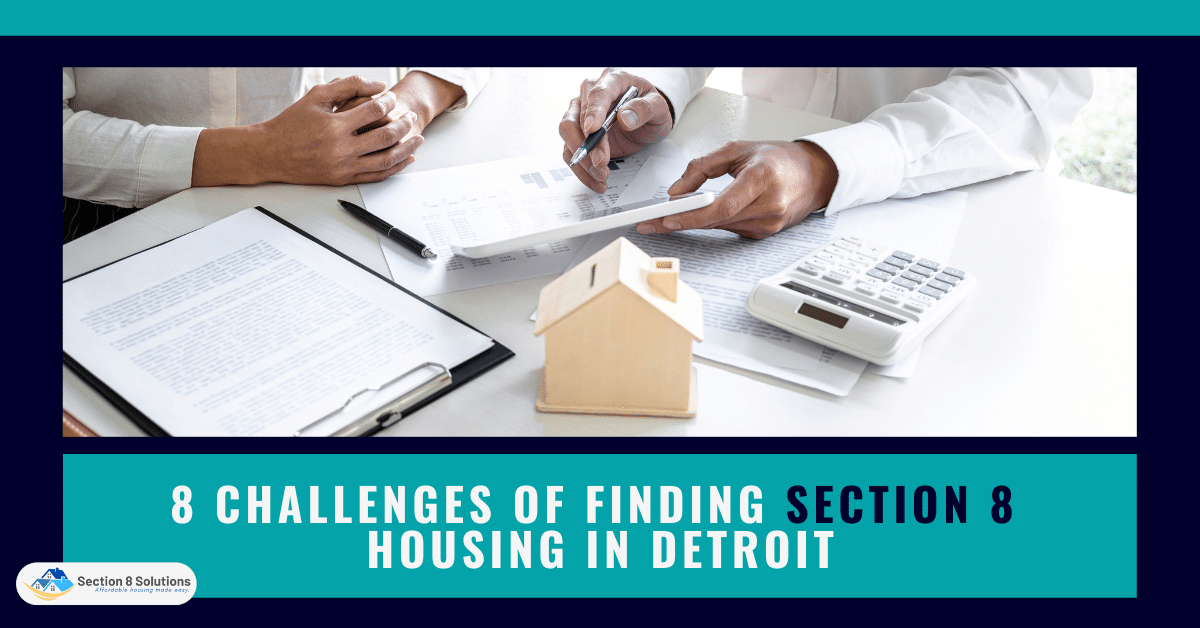Challenges in finding Section 8 housing in Detroit include long waiting lists, strict eligibility, limited availability, discrimination, high competition, low vacancy rates, and difficulty finding accepting landlords. With persistence and resources, it’s still possible to find Section 8 housing.
In this article, we will explore the eight challenges that people face when trying to find Section 8 housing in Detroit.

1. Long Waiting Lists
The waiting lists for Section 8 housing in Detroit can be incredibly long and difficult to navigate. According to the Detroit Housing Commission, the wait time for a Section 8 voucher in Detroit is currently over three years, making it one of the longest wait times in the country.
One of the primary reasons for the long waiting lists is the high demand for affordable housing in Detroit. The city has a poverty rate of over 30%, which means that there are a significant number of households in need of assistance. However, the number of available Section 8 vouchers has not kept up with this demand, leading to a severe shortage of affordable housing options.
Other things may cause extended waiting lines. Section 8 vouchers may not be granted due to inadequate financing. Slow application processing and verification might also delay Section 8 vouchers.

2. Strict Eligibility Requirements
To qualify for Section 8 housing in Detroit, applicants must meet strict eligibility criteria. These requirements include demonstrating financial need, having a clean criminal record, and meeting citizenship or immigration status requirements.
Applicants struggle to prove financial necessity. Section 8 candidates must earn less than 50% of the HUD-determined region median income. Underemployed, part-time, and financially struggling people may find this challenging.
Additionally, the criminal record requirement can be a barrier for some applicants, particularly those who have past convictions for drug offenses or violent crimes. Immigration status requirements can also be a challenge for those who may not have a permanent legal status in the United States.

3. Limited Availability of Units
Despite the high demand for affordable housing in Detroit, there is a limited supply of Section 8 housing units available. One of the main reasons for this shortage is the lack of investment in affordable housing by both the public and private sectors. This has resulted in a scarcity of rental units that are both affordable and meet the minimum standards required for the Section 8 program.
This shortage of available units can have a significant impact on Section 8 applicants. With a limited number of units available, applicants may be forced to wait for an extended period of time, or they may be unable to find suitable housing at all. In some cases, this can lead to homelessness or other housing insecurity.
Applicants might try several methods to locate units. Expanding their search outside the most in-demand areas may boost the number of available apartments. A housing counselor or other expert can assist you through the housing search and find acceptable properties.

4. Discrimination from Landlords
Despite laws prohibiting housing discrimination, some Section 8 applicants in Detroit continue to face discrimination from landlords. This discrimination can take many forms, including refusal to accept Section 8 vouchers, imposing stricter requirements on Section 8 applicants, or outright denying applications based on discriminatory factors such as race, ethnicity, or disability status.
The impact of this discrimination on Section 8 applicants can be significant, limiting their housing options and contributing to housing insecurity. Discrimination can also exacerbate existing disparities in access to safe, affordable housing.
Section 8 applicants have numerous options to avoid prejudice. A housing counselor or other expert may assist find Section 8 voucher-accepting landlords. Section 8 landlords may be found on the HUD website or other sites.

5. High Competition for Available Units
Many Detroiters apply for a restricted number of Section 8 housing units. The city’s affordable housing crisis, low-income households’ economic struggles, and the significant number of Section 8-eligible people and families generate this high demand.
Section 8 candidates might try numerous methods to boost their chances of getting a unit. Make sure their application is full and correct, including all essential papers and information. Applicants may boost their chances by applying to various waiting lists in different areas.
It may also be helpful to follow up with housing authorities or landlords to check on the status of an application and express continued interest in available units. Building positive relationships with housing authority staff or landlords can also be beneficial, as this may increase the likelihood of being selected for a unit.

6. Low Vacancy Rates
Detroit Section 8 applicants suffer low vacancy rates. Section 8 applicants have limited units to choose from. Low vacancy rates are caused by a lack of affordable housing in the city, strong demand for Section 8 apartments, and restricted program funds.
Section 8 applicants might try many methods to locate flats despite low vacancy rates. Expanding their search to other communities may boost their chances of discovering apartments. Applicants might also choose private rents or non-Section 8 subsidized homes.
A housing counselor or other specialist may assist navigate the housing market and find suitable properties. Building good connections with housing authority workers or landlords may also help you be alerted about available homes faster.

7. Difficulty Finding Accepting Landlords
Detroit Section 8 applicants struggle to locate landlords that accept vouchers. Landlords’ lack of understanding of the program, bad assumptions about Section 8 tenants, and administrative constraints make this difficult.
Some landlords may be hesitant to accept Section 8 vouchers due to misconceptions about the program, such as the belief that Section 8 tenants are more likely to cause property damage or that the program is overly burdensome to participate in. In addition, landlords may be concerned about the administrative requirements associated with the program, including inspections and paperwork.
Applicants may take numerous methods to identify more Section, 8-friendly landlords. A housing counselor or other expert may assist discover landlords who engage in the program or educate wary landlords about its advantages. Online databases or property management organizations may help applicants find Section 8-accepting homes.

8. Lack of Information and Resources
Another challenge that Section 8 applicants face in Detroit is a lack of access to accurate and up-to-date information and resources about the program. This can make it difficult for applicants to understand their eligibility, navigate the application process, and find available housing units.
Ensuring that qualified families may participate and receive benefits from the Section 8 program requires trustworthy information and services. This information might include qualifying criteria, application deadlines, available housing units, housing counseling, and legal aid.
Applicants may take many steps to acquire information and tools to overcome these hurdles. Work with a housing counseling agency or other community group that supports Section 8 applicants. These organizations may help applicants and give housing information.

Conclusion
Finally, Detroit’s low-income families depend on Section 8 for safe, affordable housing. However, extensive waiting lists, tight qualifying standards, landlord prejudice, and restricted unit availability might make it difficult for applicants to get program benefits.
To provide safe, affordable housing to all families, these issues must be addressed. This includes supporting Section 8 program expansion, affordable housing financing, and addressing Detroit’s poverty and housing insecurity.












